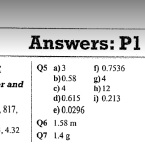
Whether I tutor in the lesson or give homework or let students practice for their exams, I always give them answers (well, if I have them, of course). What is it good for? Let me explain...
When I was in school, I always hated when I couldn't check my answers. I wasn't one of those who would just copy answers to the questions to make my life easier (that how much I really do love maths). But I wanted to be sure it's all alright and never wanted to wait for the teacher to mark it (it took ages sometimes!)
So besides the fact, some (less responsible) students would use answer sheets to skip the process and finish their work without any pain (yes, training brain and doing maths hurts, I know =), I'm trying to plant the right idea into their head by explaining WHY do they should have answers for their own use (not during the test, of course =).
Self-learning is the best way to remember things. Everyone has a different approach, someone is more visual (and will be drawing many sketches), someone needs to hear things (therefore they may keep repeating things aloud) other have their own personal way to learn and remember.
But how would you know you got there and tackled the topic if you can't check your work? And what if you have something wrong? What if you don't know at all how to get to the correct answer?
Few scenarios and how to use answers well:
1. You're quite confident with the topic, do your work, check answers, probably will get all correct, maybe something wrong. Have a look at the wrong answers - where did you do the mistake? Is there any mistake repeating? The most common reasons are wrong formulae, wrong calculations (think always about BIDMAS), not enough attention - causes silly mistakes, answering something else than what being asked in the question...
Check your mistakes, correct yourself and learn what are weak parts of your working.
2. You need to learn a topic by practising, but you're not really sure whether you do your maths correct. The best way is to do one or few questions and check answers. You don't want to end up doing A4 (or more) full of questions and get them (mostly) all wrong. Such a waste of time and energy, right? But if you'll see that you're not correct, you can stop and analyse what do you need to do to fix it.
3. You have not really many ideas how to do the work, so you can have a look to the answer and think "backwards" - how to get to the correct answer? (Works really well with trickier topics such as probability... =) Sometimes you won't get only answer, but even a bit of work or few steps explained, which also helps a lot to give you some ideas how to actually work that question out.
All scenarios include your own working and in case you don't know what to do, it doesn't mean you just copy answers and you're done. It shows you what you need to learn. Either on your own or perhaps call a maths tutor for help.



